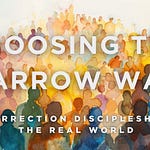Over the past few weeks, parents have asked:
“Have you made any new friends?”
“Who did you sit with at lunch?”
If you are starting a new school year, one of the major tasks is fitting in. It does not matter if you are a student, staff person, or teacher. It does not matter your grade level; fitting in means finding your place. A friend group, extracurricular activity or sports team, where to sit in the cafeteria, is priority one for the school year. There’s pressure to find your group. To get that sense of belonging where you fit in.
All of this is why we have orientations and back-to-school nights, right? To help students find their place. To fit in often means adopting a preestablished set of prescribed behaviors or attitudes.
In today’s Gospel reading, Jesus is at the center of yet another storm. Someone dared to criticize him and his disciples. And what did Jesus do? Jesus called them hypocrites and liars and tells them their worship is false. If you showed up this morning expecting Jesus to turn the other cheek or to simply be a nice guy, I am sorry to disappoint. Jesus was often attacked, criticized, and condemned for his abrasive, unsettling behavior. Most of Jesus’s critics were good religious people – those who might get up early on the Sunday of a holiday weekend and make their way to church or the kind of people you might find leading your Bible study or coaching your kids after school activities.
Jesus did not just challenge the polite pieties of his day. Jesus is about something bigger than that. Jesus’s teachings and actions got him a cross, not a certificate for civic engagement or community service. And maybe that is why I need to keep reminding myself - do you? - of just how prickly Jesus really is.
A few years ago, at a previous congregation not named Mount Olivet, I had a tough meeting with the parents of one of the students in our church’s youth group. The parents were upset because, in their words, “their child went on a week-long mission trip so they would know how privileged they were.” These parents did not expect their child to come home a Christian. They just wanted to instill a sense of humility into their child, hoping they would become a good kid. Maybe it was the sleep deprivation or my blood sugar was low, but my response of “sending your child on a trip to meet Jesus and expecting anything different seemed a bit unreasonable” was not well received.
I replayed the events of the encounter with a trusted mentor. He reminded me of this scene from the Gospel of Mark. He asked me, “Teer, what part of the cross do you not understand? Did it ever occur to you that maybe you are in this mess because of Jesus? Maybe, just maybe, in transforming that student’s life, God is going to transform their parents.”
An unruly mob or a hired assassin did not kill Jesus. He was officially executed for being a king other than Caesar, put to death by people in power, both religious and imperial. So, call him what you will: prophet, friend, savior, or teacher. But you cannot deny that Jesus caused trouble by asserting the reign of God.
He was killed for telling his followers to pray the prayer we will pray together for saying, “Thy Kingdom come; thy will be done.” People often think the church is where they can bring their kids to learn how to be good people. They read the beginning of The Gospel of Mark and see “The beginning of the good news of Jesus Christ, the Son of God,”[i] and think the good news of Jesus will make their kid good or teach their kid how good they have it at home. But when you read the rest of The Gospel of Mark and see the trouble Jesus caused, how can we expect our kids to be anything but troublemakers in the eyes of those who insist that to be good is to do what has always been prescribed or performed by others?
The Letter of James says, “Be doers of the word, and not merely hearers who deceive themselves.”[ii] James is not talking about doing good for the sake of doing good or fitting in at church by adopting a superficial Christian vernier. James is talking about a faith that transforms us from the inside out, softening our hearts to see the world as God sees the world. A faith that results in action that flows from a transformed heart.
As a pastor, I’ve received several phone calls from anxious parents about getting their children baptized and what it means for children of all ages. I always tell the parents that baptism, not just the vows that the parents will take or that their child will take, clothes their child in Jesus’s life, death, and resurrection. All of what Jesus did and who Jesus is is now upon their child. I remind them that baptism is one of the ways we that we become more Christ-like. So, I was surprised when one of those families called the church office a few years ago and demanded to speak with me. I had accompanied their oldest child when they were baptized before they went off to college. The parents were upset. And they needed me to talk some sense into their child (their “child,” mind you, who had just finished a bachelor’s degree at UVA).
“Help. She has become a religious nut!”
The parents proceeded to tell me that their “religious nut” decided not to attend law school at Georgetown after graduation. Instead, they were moving to El Salvador to live among and minister to the poor. And that’s when I said – well, I didn’t say it to them because we all know I’m so awfully nice, but I said it to myself – “How about that? Jesus is up to his old tricks again.”
Amen.
[i] Mark 1:1
[ii] James 1:22














